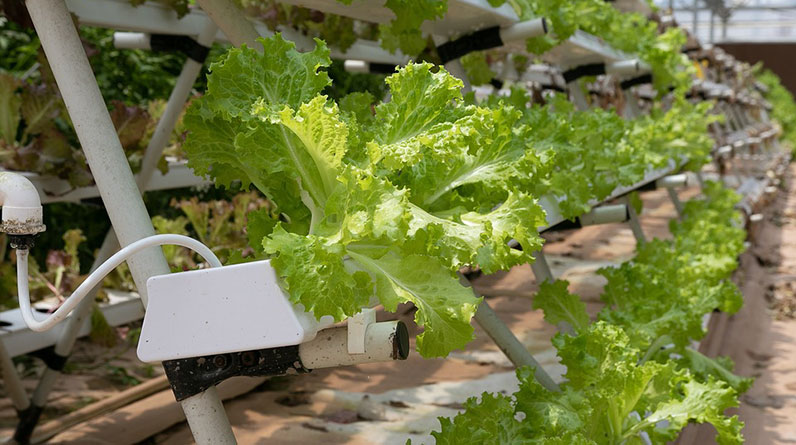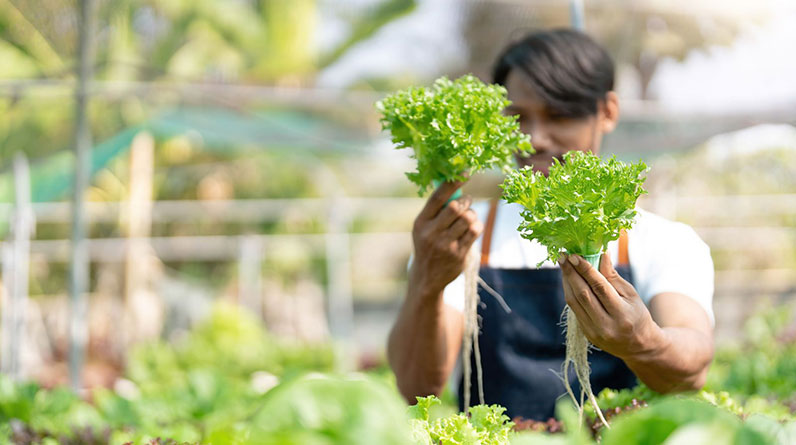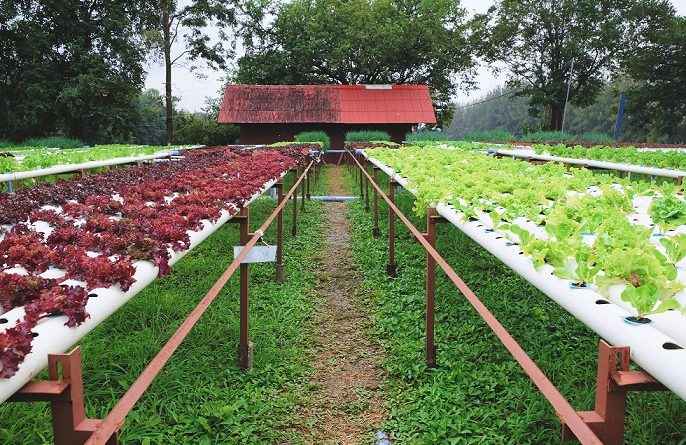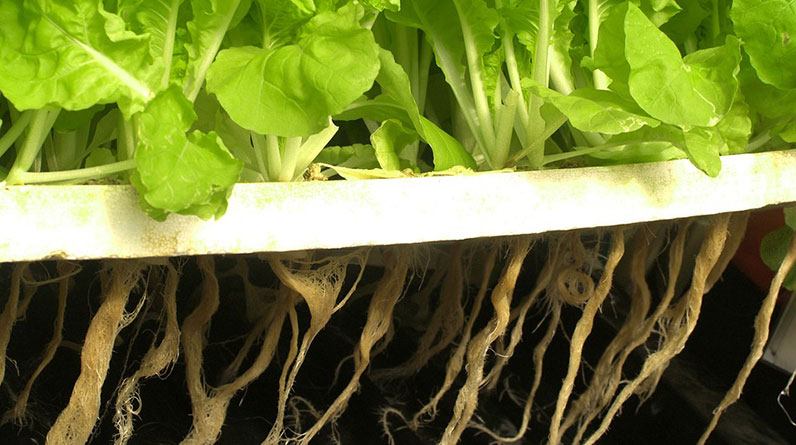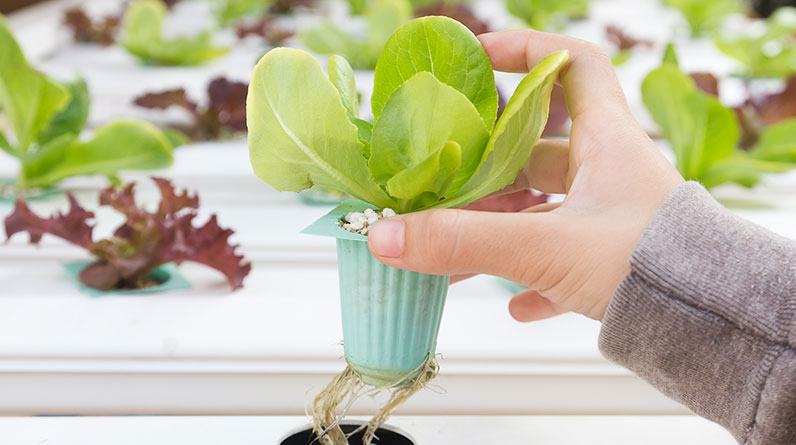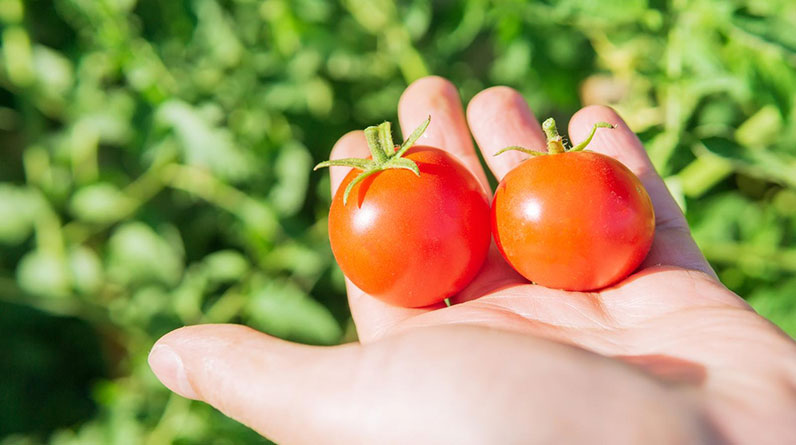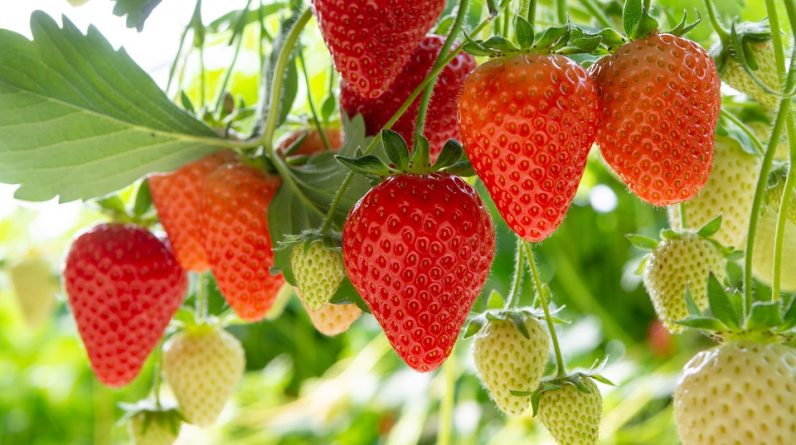
Hydroponic Gardening is an excellent growing method used to produce delicious and nutritious vegetables and fruits. The types of plants you grow will depend on your own unique preferences. In this article, we will discuss our top five favorite plants that are commonly grown in hydroponic gardens along with some of their main benefits:
Grow Tomatoes with Hydroponic Gardening:
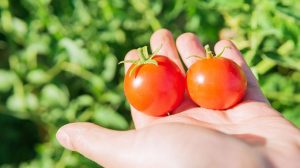 Tomatoes are an excellent plant to grow in a hydroponic garden for several reasons. Firstly, hydroponic gardening involves growing plants without soil, instead using nutrient-rich water as the growing medium. This means that plants can receive an optimal balance of nutrients, water, and oxygen, leading to faster growth, healthier plants, and higher yields.
Tomatoes are an excellent plant to grow in a hydroponic garden for several reasons. Firstly, hydroponic gardening involves growing plants without soil, instead using nutrient-rich water as the growing medium. This means that plants can receive an optimal balance of nutrients, water, and oxygen, leading to faster growth, healthier plants, and higher yields.
Tomatoes, in particular, thrive in hydroponic systems due to their high nutrient needs. They require a mix of macronutrients, such as nitrogen, phosphorus, and potassium, as well as a range of micronutrients including iron, zinc, and calcium. Hydroponic setups allow for precise nutrient management, leading to healthier plants and a well-balanced harvest.
Furthermore, growing tomatoes in a hydroponic system can help minimize issues such as pests and disease. Without soil, there is less chance of soil-borne diseases and pests, which can harm plants in traditional soil-based gardening. This means less need for pesticides and other chemical treatments, leading to healthier produce that is also safer for consumption.
Hydroponic systems also offer a year-round growing option, making it possible to grow tomatoes even in colder months. This means that fresh, homegrown tomatoes can be enjoyed at any time of year, without the need for greenhouse or outdoor garden space.
Finally, hydroponic gardening is space-efficient, making it an ideal option for those with limited yard space or living in urban areas. With a hydroponic system, tomatoes can be grown in a small indoor setup, without the need for expansive garden space.
Overall, tomatoes are an excellent plant to grow in a hydroponic garden due to their high nutrient requirements, ability to thrive in hydroponic systems, minimal issues with pests and disease, year-round growing potential, and space-efficient nature.
Grow Lettuce with Hydroponic Gardening:
Lettuce is undoubtedly one of the most popular salad greens and is appreciated for its crisp texture and refreshing flavor. It is considered an excellent plant to grow in a hydroponic garden due to its growth rate, high yield, and low maintenance. Here are some reasons why lettuce is an excellent choice for hydroponic gardening:
- Faster growth and yield: Lettuce is a fast-growing crop, unlike some other vegetables grown in hydroponics. Due to its rapid growth, it requires comparatively less time to reach maturity. Additionally, with hydroponic gardening, the plants grow faster than traditional soil gardening and require less space, allowing for more significant yields.
- Disease and pest resistance: Growing lettuce hydroponically reduces the potential for soil-borne diseases. Additionally, hydroponic gardening eliminates the need for soil and soil-borne insects, which reduces the risk of pests and other pathogens that could damage the crop. Thus, it increases the chances of successful cultivation.
- Nutrient-efficient: For the most part, lettuce needs nitrogen, potassium, phosphorous, and calcium to grow adequately, and these minerals are readily available in hydroponic feeds. The precise feeding systems used in hydroponic gardening enable the plants to absorb only the required nutrients, giving them an even grow rate and consistent size.
- Space and resource-efficient: With hydroponic gardening, it is possible to control the size and shape of the lettuce plants. This allows for more efficient use of the available space and water resources, thereby increasing the yield. In terms of water usage, it is commonly known that standard farming methods are water-intensive. However, hydroponic gardens use just 10% of the water required for traditional soil gardening.
- Great for year-round crops: Lettuce is a suitable hydroponic crop that can be cultivated year-round and does not require much sunlight to thrive. With a controlled environment, even unfavorable weather conditions cannot affect its growth, making it a reliable crop for year-round cultivation.
In conclusion, lettuce is an excellent plant to grow in hydroponic gardens due to its fast growth and high yield, pest-resistant nature, nutrient efficiency, resource efficiency, and suitability for year-round cultivation. If you are looking to start a hydroponic garden, lettuce is a crop that should be on your list of options, and with the right knowledge, you can have a thriving garden in no time.
Grow Strawberries with Hydroponic Gardening:
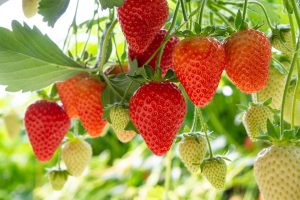 There are several reasons why strawberries are an excellent plant to grow in a hydroponic garden. Firstly, hydroponic cultivation provides a controlled environment where all the nutrients needed for plant growth are added to the water supply. This is important because strawberries require a precise balance of nutrients to thrive, particularly nitrogen and phosphorus. This is particularly important in soilless environments, where nutrients can be easily washed away by excess water.
There are several reasons why strawberries are an excellent plant to grow in a hydroponic garden. Firstly, hydroponic cultivation provides a controlled environment where all the nutrients needed for plant growth are added to the water supply. This is important because strawberries require a precise balance of nutrients to thrive, particularly nitrogen and phosphorus. This is particularly important in soilless environments, where nutrients can be easily washed away by excess water.
Secondly, hydroponic gardening allows for a more efficient use of space. Since hydroponic growing systems do not require soil, plants can be grown much closer together than in traditional soil-based gardens without compromising their growth. This means that they can produce higher yields in a smaller area, making hydroponic gardening ideal for small-scale growers or those with limited outdoor space.
Thirdly, hydroponic gardening provides plants with an optimal growing environment, allowing them to grow faster and produce higher yields. Because hydroponic systems provide an ideal growing environment, strawberries grown in hydroponics can mature much faster than those grown in traditional soil-based gardens. This means that they can be harvested much sooner and can produce higher yields over a shorter growing season.
Finally, hydroponic gardening is an eco-friendly way to grow plants. Hydroponic systems use significantly less water than traditional soil-based gardens and also require fewer pesticides and fungicides to control pests and diseases. This means that hydroponic gardening can help save water and reduce the use of harmful chemicals in agriculture.
In conclusion, strawberries are an excellent plant to grow in a hydroponic garden because they require precise nutrient balance, can be grown more efficiently in a smaller space while producing higher yields, mature faster, and provide an eco-friendly way to grow plants. With all these benefits, it is easy to see why hydroponic gardening is becoming increasingly popular among gardeners and farmers alike.
Grow Basil with Hydroponic Gardening:
Basil is a popular herb grown in hydroponic gardens because it is easy to grow and produces high yields. It also has a pleasant aroma and flavor, making it a favorite choice for culinary purposes.
Grow Peppers with Hydroponic Gardening:
Peppers are a popular choice for hydroponic gardens because they require a lot of water and nutrients to thrive. They also produce high yields of flavorful peppers that can be used in a variety of dishes, making them a versatile addition to any garden.

